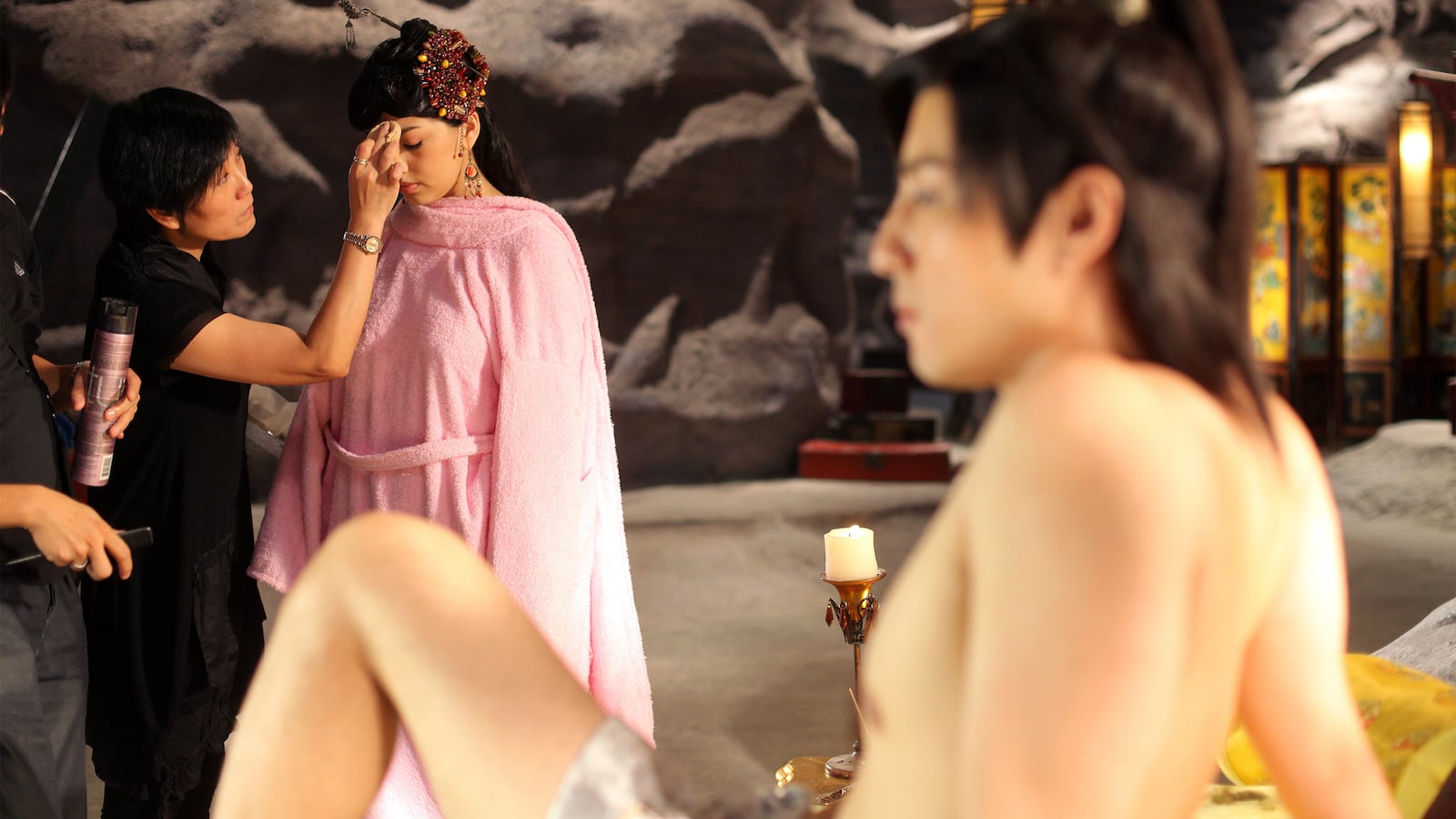Her almond-shaped eyes quickly dart to the floor, lest she appear overeager as she recites the menu to a new customer. Today’s special: a full-body massage with half-price happy endings. The man feigns shock, claiming he’s just there to ease his sore muscles after a long day of work. Smiling, her kimono slips a little lower as she seductively vacillates between intense sexual desire and docile servitude. It’s the cliché massage parlor scene that every female Asian porn star is asked to do.
Yes, porn perpetuates these stereotypes, perhaps at times carelessly, but it is entertainment not education. So, when a 21-year-old white gunman kills eight people, six of whom were Asian women, at three different Asian massage parlors in Atlanta and blames his self-diagnosed sex addiction, naturally porn becomes part of the conversation. He faulted the women’s existence for his unrequited sexual frustrations, telling police, “I had to remove the temptation.” Whether or not they were sex workers is less relevant than the disturbing stereotyping that Asian women working at massage parlors couldn’t be anything but.
Whether it’s the adult entertainment industry’s cross to bear or not, it has a real impact on society.
“In some ways, we are the sex educators of people who don’t get it from schools or their parents,” explains adult actress Ember Snow, who believes most porn is based on a fetish. “The person performing a scene becomes an object. I have no problem with that. The question is: Am I a positive object or am I a negative object? Is what I am doing on screen being seen by someone who appreciates my performance in a positive way, or am I an object of some negative trauma they suffered in the past and now I’m that outlet for their anger and frustration?”
As a Filipino performer, Snow has been cast in plenty of massage parlor scenes, noting that roles fetishizing her ethnicity were more prevalent in 2017, at the beginning of her adult career, than they are now.
“In the last few years, the roles I have been asked to play have become very race-neutral,” observes Snow. Though that does not preclude a company from later marketing the non-derogatory scene with racially explicit titles like Asian Invasion. “It’s a sad truth that Asians will always be fetishized, but I have seen the industry trying to take steps to cast us in roles where we are just another girl. The more that happens, I think the less of a fetish Asians will become,” remarks Snow. “You’re never going to escape the ‘geisha’ or ‘massage parlor’ stereotype. That’s unfortunate. But if you have 25 non-Asian roles for every one ‘massage parlor’ role, then it lessens the impact.”
A search for “Asian massage” on Pornhub yields over 6,600 videos, some boasting tens of millions of views.
With hate crimes on the rise, people are questioning (and at times blaming) the effects of racial stigmatization in adult entertainment. Violence toward Asians and Asian Americans increased by149 percent in 2020, largely due to scapegoating over the COVID-19 pandemic. And it’s women who are disproportionately victimized, representing nearly 70 percent of reported hate incidents according to information gathered by STOP AAPI HATE researchers.
Perhaps taboo fantasies aren’t at the heart of the issue; it’s the misogyny and racism driving it.
Embracing the numerous Asian-centric roles she’s performed over the last five years, Kimberly Chi puts a positive spin on what many might call stigmatizing, deftly reframing the conversation.
“I don’t take it too seriously. I’ve played the massage lady and the exchange student, but it was positive,” says Chi, who identifies as East Asian, Polynesian, Thai, and Cambodian. “Depicting people from another country that barely speak English but they feel welcome, those scenes expose differences. They show people to love regardless of their race or where they’re from or what their background is.”
Chi describes the ethnic stereotypes played up in porn as a way to encourage acceptance and celebrate our differences. “To the public it might seem like racism but when we play stereotypes it’s part of reality,” says Chi. “It’s a part of the culture and it’s not something that brings us down, we’re actually bringing out the best in people’s culture.” (Chi even pokes fun at the genre with her name—the tagline on her personal website reads “taste some Kim Chi.”)
Penthouse Pet Marica Hase also has a unique perspective on how Asian women are portrayed in porn, being one of the few adult actresses to transition from the Japanese adult entertainment industry to the American one. “There are only a few Asian girls in the adult American industry. So, I think being Asian actually helps me get work and opportunities in the industry,” says Hase.
When asked about her experiences with stigmatization in the industry, Hase couldn’t recall any.
“Personally, I’ve never encountered racism on set. I will tell you an interesting story. I worked with five girls on a movie and we were shooting photos for the box cover. One of the five girls said I was an ugly Asian girl and asked why I was in the center. The director let her know I’m a Penthouse Pet and more famous than her, and they also wanted to place me in the center because of the lighting. Some people might think that’s racist, but I don’t feel that’s racist. So sometimes, it’s a little difficult to judge what’s racism and what isn’t,” explains Hase.
Exploiting racist genres may soon be a thing of the past, according to Mark Schecter, owner of Adult Talent Managers (ATMLA). He credits the recent #BlackLivesMatter movement with pushing the adult industry into a more inclusive future.
“It’s different now. It’s a little more sensitive and it’s not as exploited as before, but with that said, I still have difficulties just trying to change the continued systemic process of booking talent based on race or color. It’s still prevalent,” notes Schechter. “Black, Asian, Hispanic talent even today are the most marginalized because of that systemic process that has prevailed for so many years.”



